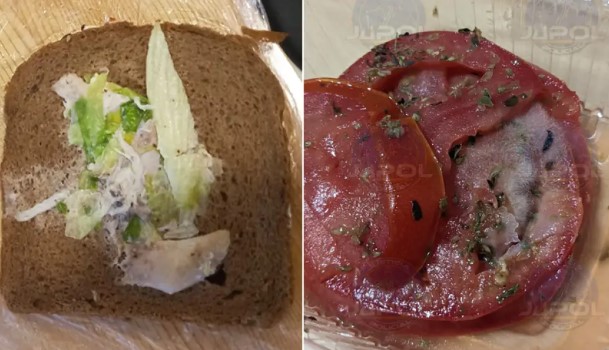The security at the high-profile UN Summit in Seville is overshadowed by a growing scandal: Police and Guardia Civil unions are raising the alarm about the disastrous conditions under which officers are forced to work. While the political elite revels in luxury, security forces are confronted with spoiled food and ridiculously low expenses. A situation that is not only outrageous but also raises serious questions about the Ministry of Interior’s duty of care.
Mold, Shortages, and Lack of Provisions: A Look Behind the Scenes of the Summit
The accusations made by the JUPOL and SUP unions are serious and supported by shocking photographic evidence. Trainees accommodated in a student dormitory found moldy tomatoes and sandwiches containing little more than half a lettuce leaf and some mayonnaise. Chickpeas resembling leftovers from the previous day and rolls filled with tiny pieces of tuna complete the picture of substandard catering. JUPOL emphasizes that spoiled food, such as the moldy tomatoes, crosses a red line and that legal action is being considered against the catering company and potentially the Ministry of Interior. The requested catering contract to clarify the incurred costs and responsibilities has not yet been provided.
Hoy los Reyes ofrecen una cena, en el Real Alcázar de Sevilla, con motivo de la “IV Conferencia Internacional sobre la Financiación para el Desarrollo” de Naciones Unidas.
— JUPOL (@JupolNacional) June 29, 2025
Esta es la cena que ha “ofrecido” Interior y DGP a algunos de los Policías desplazados a #FFD4Sevilla. pic.twitter.com/S5xaOJkZUb
The United Police Union (SUP) echoes these sentiments, criticizing the extremely low allowances that have not been updated since 2002: 48.92 Euros for hotels and 28.21 Euros for all three daily meals. With these amounts, it is simply impossible to find adequate accommodation and food in 2025, especially in a major city like Seville during an international summit. Many officers are forced to seek accommodation over 100 kilometers away and endure long daily commutes.
Heat, Thirst, and Double Standards: The Reality of Police Officers in Seville
Another scandalous point is the lack of water supply given the extreme heat in Seville, where temperatures exceed 40 degrees Celsius. Officers work long hours in direct sunlight, yet an organized water supply from the General Directorate of Police is completely absent. They are forced to use their short breaks to find supermarkets and buy their own water – an untenable situation that endangers the health of the deployed forces.
The Guardia Civil, represented by the Unified Association (AUGC), also joins the criticism. A typical menu for some of their agents reportedly consisted of just a sandwich with two slices of ham, an apple, a small bottle of water, and a juice. The AUGC denounces the “unworthy menus and pathetic conditions” offered to those responsible for the country’s security. Furthermore, the massive discrepancy in allowances between officers and other ranks of the Guardia Civil is criticized, which can amount to over 100 Euros per person per day. The unions demand an immediate end to this “uniformed precarity.”
The revelations from Seville cast a disturbing light on the appreciation and care shown to the security forces in Spain. While politicians and international guests indulge in luxury, the guardians of order are forced to work under conditions bordering on exploitation. A comprehensive investigation and immediate measures to improve the situation are essential to restore trust in those responsible and to ensure the health and dignity of the deployed forces.




